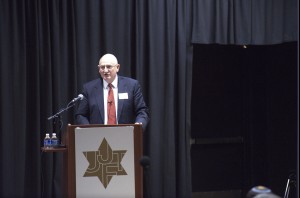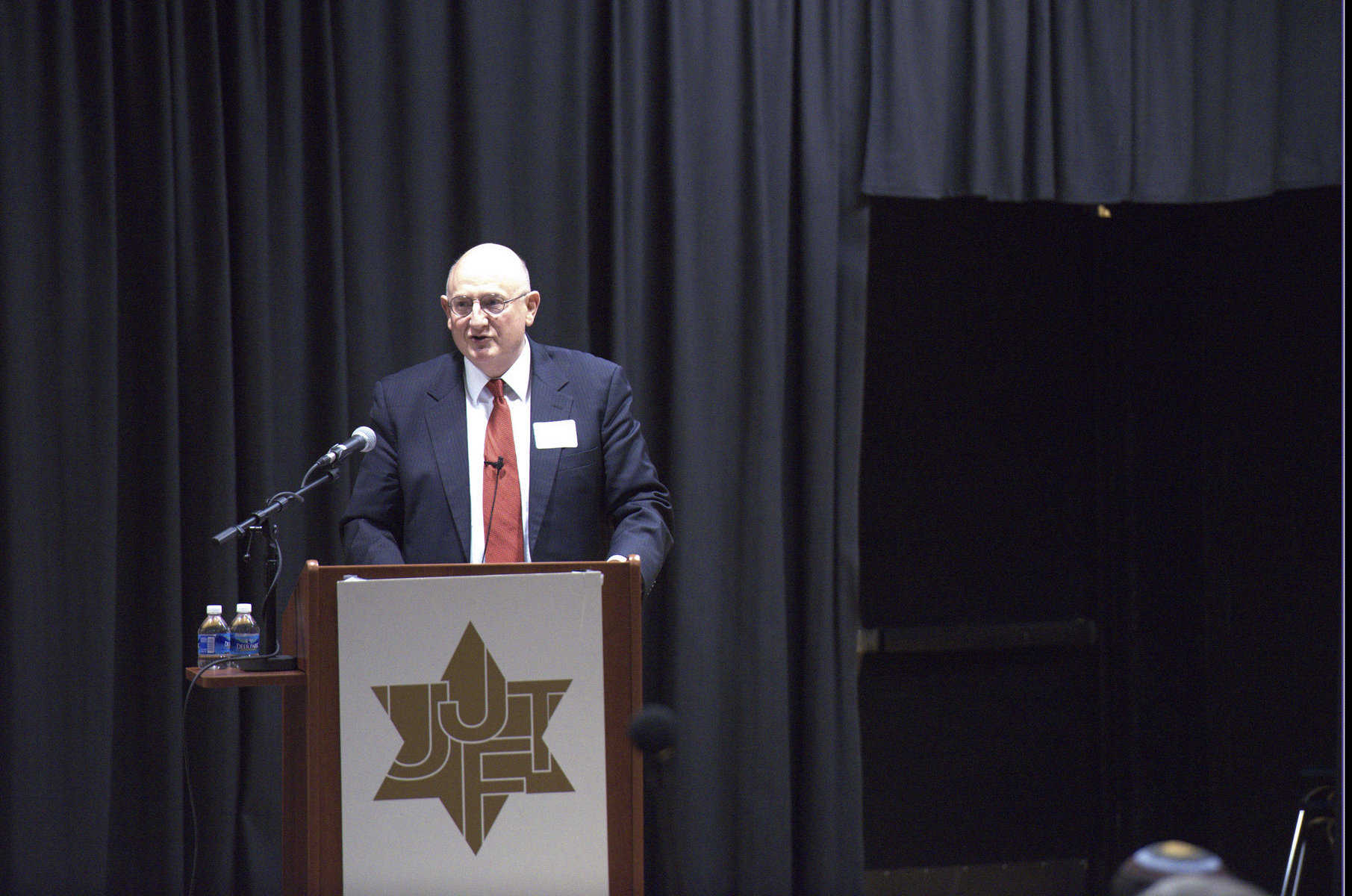
Ira Forman at the Sandler Family Campus.
Amidst horrific reports of anti-Semitic violence emanating from Europe, and just one day before hostages were killed at a kosher French market, the United Jewish Federation of Tidewater presented a timely program, The Rise of Anti-Semitism: A Resurgence of Evil.
More than 150 members of the community braved sub-freezing temperatures to gain an informed perspective on this alarming issue on Thursday, Jan. 8. The presentation at the Sandler Family Campus featured Ira Forman, Special Envoy to Monitor and Combat Anti-Semitism (SEAS) to the U.S. State Department.
Forman offered an insider’s knowledge of, and perspective on, anti-Semitic conditions in the world today.
“I see a different form of anti-Semitism in every country I visit,” Forman said.
While highlighting recent events in France, Forman emphasized that anti-Semitism is not unique to Western Europe. He referenced a survey conducted by the Anti- Defamation League (ADL) indicating the presence of just as much, if not more, sentiments of anti-Semitism in several Eastern European nations.
Nearly half of Hungarian Jews polled by the ADL expressed that they had thought about leaving their country due to anti-Semitism. In his discussion, Forman explained that the thought of leaving is not the same as the act of leaving behind one’s home, heritage, culture and language. It is not always clear why or under what circumstances thoughts are turned into actions as a result of anti-Semitism.
Overt and violent anti-Semitism, a phenomenon rearing its ugly head in France, has led to sudden attention from global media and reports of mass emigration. Other forms, no less threatening, continue to surface in more subtle or indirect forms around the world. In fact, Forman asserted that no country is without some form and degree of anti-Semitism, including the United States.
In the aftermath of Israel’s conflict with Gaza last summer, the upsurge of acts of hatred appeared to echo the horrors of a different period. Previously thought to have faded away with the end of World War II , rampant anti-Semitism has now led many to question the security of Jews in modern times.
Forman assured the crowd that modern anti-Semitism is not the same as it was in the 1930s. This time, governments and societies are denouncing the perpetrators. Public institutions and the law in many countries today are on the side of the Jews.
Nearly half of the audience members were unaware prior to the presentation that a position dedicated solely to addressing anti-Semitism existed in the U.S. government. The presence of Forman’s role demonstrates a positive shift in governmental involvement against anti-Semitism.
In a particularly inspiring and uplifting piece of his somber presentation, Forman described the work to combat anti-Semitism being done by local in-country non-governmental organizations (NGOs), non-profits and community groups around the globe. While many of these groups are run by Jewish community members, others are comprised of non-Jewish individuals who are highly passionate and committed to religious freedom and tolerance.
Anti-Semitism today is “not only a Jewish issue. It is a human rights issue.” Forman said.
“We can’t stop it,” said Forman. Anti- Semitism has been around for thousands of years, and it will continue to exist throughout our lives and the lives of our grandchildren.
However, Forman added that we can work to alleviate anti-Semitism and “tune it down.” This is done on the ground through numerous global and in-country NGOs, with public diplomacy and through private, bilateral diplomacy between governments.
While anti-Semitism has become a human rights issue, it is justifiably one of particular concern to the global and local Jewish community. This was evident during the question and answer session that followed Forman’s presentation.
Tidewater community members wanted to know about conditions for Jews in specific nations around the world, Israel’s involvement in the fight against anti-Semitism and clarity on the increasingly blurred distinction between what is anti-Israel and what is anti-Semitism.
In response to a question about anti-Israel versus anti-Semitic intent, Forman noted that free speech includes the right to comment on, and be critical of, specific national policies and actions. Israelis themselves may criticize Israel, just as Americans may criticize America’s decisions and politics. However, a point exists when the line between anti-Israel and anti-Semitism is crossed.
Forman enlightened the audience with a description of the “Three ‘D’s” used to define anti-Semitic, rather than purely anti-Israel intent:
•De-legitimization, or questioning Israel’s sovereignty and right to exist, while the existence of other nations are not called into question.
•Defamation, equating the actions of Israel to those of, for example, the Nazis.
•Double standard, holding Israel to a standard different from and above that of other nations.
Forman concluded with a question that many audience members wanted answered:
What can be done?
Forman offered three main recommendations to the Tidewater community:
• Stay educated. Attending events such as this one sponsored by the UJFT is one of many ways to remain informed and stay abreast of the issues.
• Turn to resources like UJFT’s Community Relations Council for additional information about anti-Semitism and how to appropriately respond.
• Research the activity of local, national and international organizations addressing anti-Semitism.
All attendees received a resource guide provided by the UJFT’s Community Relations Council. The resources provide additional reading, up-to-date news sources, and a few of the most prominent organizations working tirelessly to fight anti-Semitism in the U.S. and abroad.
“Now more than ever with anti-Semitic acts on the rise, we must remain vigilant, well-informed and united as a Jewish community,” says Miles Leon, UJFT president.
by Samantha Golden

